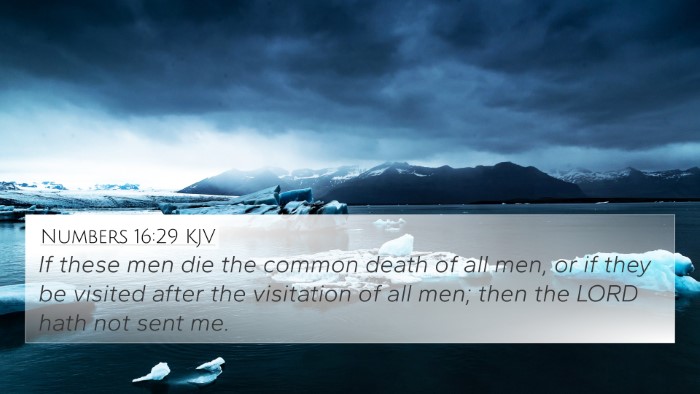Old Testament
Genesis Exodus Leviticus Numbers Deuteronomy Joshua Judges Ruth 1 Samuel 2 Samuel 1 Kings 2 Kings 1 Chronicles 2 Chronicles Ezra Nehemiah Esther Job Psalms Proverbs Ecclesiastes Song of Solomon Isaiah Jeremiah Lamentations Ezekiel Daniel Hosea Joel Amos Obadiah Jonah Micah Nahum Habakkuk Zephaniah Haggai Zechariah MalachiJob 10:16 Similar Verses
Job 10:16 Cross References
For it increaseth. Thou huntest me as a fierce lion: and again thou shewest thyself marvellous upon me.
Uncover the Rich Themes and Topics of This Bible Verse
Listed below are the Bible themes associated with Job 10:16. We invite you to explore each theme to gain deeper insights into the Scriptures.
Job 10:16 Cross Reference Verses
This section features a detailed cross-reference designed to enrich your understanding of the Scriptures. Below, you will find carefully selected verses that echo the themes and teachings related to Job 10:16 KJV. Click on any image to explore detailed analyses of related Bible verses and uncover deeper theological insights.

Isaiah 38:13 (KJV) »
I reckoned till morning, that, as a lion, so will he break all my bones: from day even to night wilt thou make an end of me.

Numbers 16:29 (KJV) »
If these men die the common death of all men, or if they be visited after the visitation of all men; then the LORD hath not sent me.

Deuteronomy 28:59 (KJV) »
Then the LORD will make thy plagues wonderful, and the plagues of thy seed, even great plagues, and of long continuance, and sore sicknesses, and of long continuance.

Hosea 13:7 (KJV) »
Therefore I will be unto them as a lion: as a leopard by the way will I observe them:

Amos 3:8 (KJV) »
The lion hath roared, who will not fear? the Lord GOD hath spoken, who can but prophesy?
Job 10:16 Verse Analysis and Similar Verses
Understanding Job 10:16
Job 10:16 reads: "And if I be guilty, woe unto me! And if I be righteous, yet will I not lift up my head: I am full of confusion; therefore see thou mine affliction."
This verse encapsulates Job's deep turmoil and existential struggle as he confronts his suffering and perceived guilt before God. It’s a window into Job's state of mind as he oscillates between feelings of guilt and righteousness, yet finds himself devoid of hope.
Insights from Public Domain Commentaries
Matthew Henry
Matthew Henry emphasizes Job's profound agitation and his feeling of being entangled in a conundrum of morality and suffering. Henry states that Job feels ravaged by his predicament, regardless of his moral standing. He suggests that Job’s cry expresses the intensity of his inner conflict between recognizing his own sins and the overarching afflictions he endures.
Albert Barnes
Albert Barnes clarifies that Job's lament highlights the theme of human helplessness in the face of divine judgment. Barnes suggests that Job acknowledges his sinfulness but also expresses the feeling that no matter his righteousness, he remains overwhelmed by life’s burdens. His reflections suggest a deeper theological inquiry about the nature of suffering and the justice of God.
Adam Clarke
Adam Clarke explains that Job’s confusion and despair stem from a perceived lack of justice in his suffering. He underscores Job's plea for understanding and the impossibility of a clear answer from his condition. Clarke raises existential questions that resonate through centuries about the suffering of the innocent and the workings of divine providence.
Key Themes in Job 10:16
- Human Suffering: Job's lament highlights the reality of human suffering and the perplexity it brings.
- Divine Justice: The verse invites debate on the nature of divine justice, especially when the righteous suffer.
- Inner Conflict: Job articulates the complex internal struggle between guilt and righteousness.
- Desperation for Understanding: Job’s question implicates a yearning for comprehension of God’s ways.
Cross References for Job 10:16
To deepen our understanding of Job 10:16, we can explore these biblical cross-references:
- Psalm 13:1-2 - A cry of despair and questioning God’s forgetfulness.
- Psalm 38:4 - The acknowledgment of guilt and the weight of sin.
- Ecclesiastes 7:15 - The struggle with righteousness and the mystery of life's injustices.
- Romans 3:23 - The universal nature of sinfulness that leads to suffering.
- Job 19:28-29 - Job’s reflections on his unjust suffering and his hope in a Redeemer.
- 2 Corinthians 12:7-10 - Apostle Paul's reflection on suffering and God's grace.
- James 5:11 - The acknowledgment of Job’s perseverance amid suffering.
Comparative Analysis of Job 10:16
In conducting a comparative Bible verse analysis, it's crucial to see how Job's sentiments connect with both the Old and New Testaments. The themes of suffering, justice, and righteousness are woven throughout scripture:
- Linking with the Gospels: Jesus' own suffering bears parallels with Job's plight, particularly in passages detailing His anguish leading to the crucifixion.
- Identifying connections between narratives: The story of Joseph (Genesis 37-50) showcases a man maintained integrity yet suffered profoundly, echoing Job's situation.
- Thematic connections with the Prophets: Prophets like Jeremiah also express feelings of despair and confusion in the face of divine silence (Jeremiah 20:7-9).
Conclusion
Job 10:16 serves as a poignant reflection on the struggle between human distress and the quest for divine justice, inviting readers to engage in deeper scriptural dialogue through effective cross-referencing. The multitude of Bible verses that relate to this passage offers a broader understanding of themes such as suffering, righteousness, and the human condition in its relationship with the divine.
Tools for Bible Cross-Referencing
For those exploring Bible summaries and interpretations, utilizing tools like a Bible concordance or a Bible cross-reference guide can be invaluable. These resources aid in:
- Discovering cross-references that enhance understanding.
- Engaging in cross-reference Bible study methods for deeper insights.
- Identifying significant links between verses, themes, and concepts throughout scripture.




